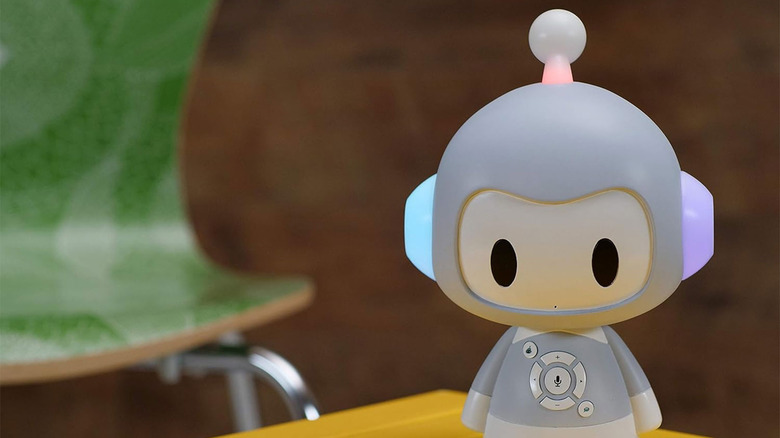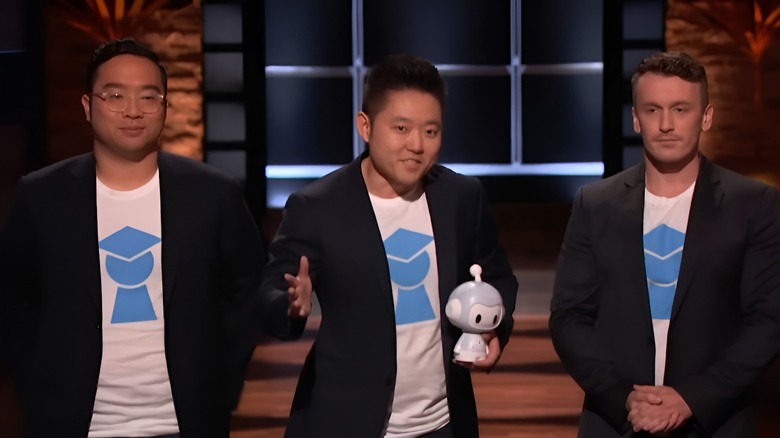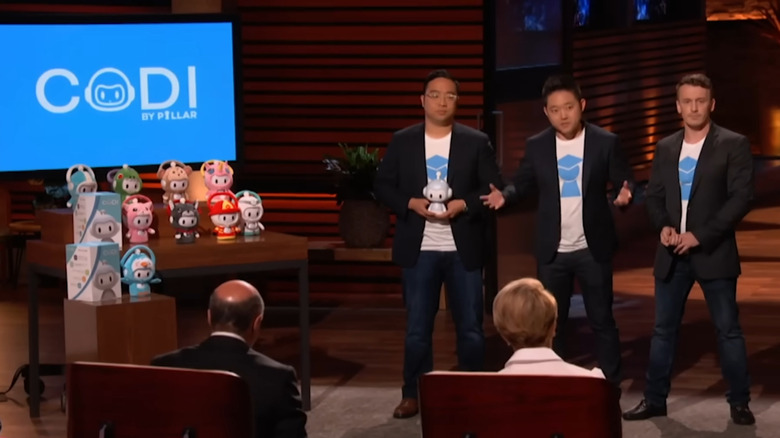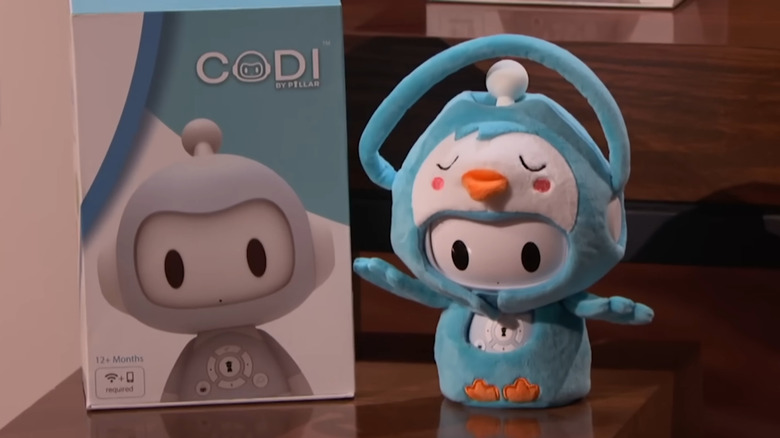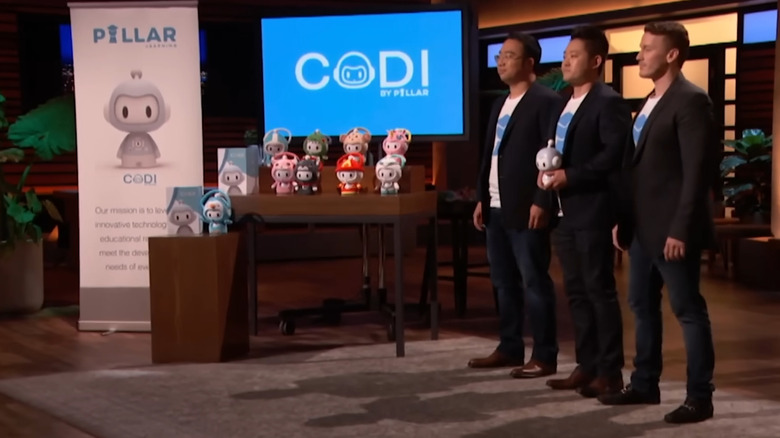What Happened To The Codi Robot From Shark Tank Season 12?
We may receive a commission on purchases made from links.
It's no secret that most kids nowadays are more technologically adept than a good portion of the adult population. As surreal as it may be for some to see an entire generation growing up with smartphones and tablets in their hands rather than dolls and yo-yos, there are certainly benefits to the way that technology can be useful in the classroom and develop good skills. But what if there was a tool out there that could perform these functions while leaving out the overwhelming excess characteristic of mobile devices?
This was the idea that set The Codi Robot in motion. Developed by electronics manufacturer Pillar Learning, Codi Robot is an AI-integrated educational robot made to teach and entertain kids with a variety of functions. Using the accompanying smartphone app, parents can access Codi's library of songs and more than 130 classic stories while also using the robot to communicate with and remind their kids of important tasks and routines. Made with an appealing design and the option to customize it with a variety of costumes and accessories, the Codi Robot is made to engage with kids in a safe manner while cutting down on screen time, thus avoiding harmful side effects.
Codi was the brainchild of tech expert Dayu Yang. Having had experience in the tech and consulting realm prior to starting Pillar Learning, Yang became interested in the role that technology played in the development of children. With that, he, alongside education content head William Mock and product developer Chris Oselbo, went on to develop the Codi and test it with families, eventually launching it in late 2018.
What happened to The Codi Robot on Shark Tank?
Pillar Learning founders Dayu Yang, William Mock, and Chris Oslebo entered the tank seeking a $500,000 investment for a 10% stake. After giving their initial pitch, they demonstrated the Codi Robot's interactive capabilities with a short video where a trio of siblings utilize the device to play, perform chores, and interact with their mom. They further elaborated on how parents can use the accompanying app to monitor and control how Codi communicates with their kids.
Each unit cost $25.76 to produce and was sold for $99.99. Up to this point, the company made $260,000 through online sales. While all of the app's content was free, they intended to test out a paid content model by the end of the year. The sharks brought up concerns regarding competition from the likes of Amazon as well as the company not showing strong proof of how successful its product was at maintaining kids' attention. The trio believed that the human quality of their item helped it stand out and further discussed plans to enter big box retailers and cut down on product costs to aid in growth.
The sharks all opted out, citing the competition as their big reason for stepping away. However, Oslebo described their plan to boost sales with support from their manufacturer by supplying to retailers through direct import. Their hope was to have a shark to make it easier to get retailers on board. Robert Herjavec decided to take a risk on the trio by offering $500,000 for 25% equity. After some attempts to bring the percentage down, they took Herjavec's deal.
The Codi Robot after Shark Tank
The team behind the Codi Robot achieved a rare victory on "Shark Tank" by managing to reel in an investor after the entire panel seemingly exited the deal. It's no doubt a testament to their deal-making capabilities that this was accomplished, but did their success on the show translate to increased business in the episode's aftermath? Codi Robot made its "Shark Tank" debut on December 11, 2020, as part of Season 12 of the series. Within the first week of the episode's airing, Codi Robot saw a massive boost in sales, with the company's website stating that "10s of thousands sold in the United States" during this period.
In fact, business was perhaps a bit too good as a result of bad timing. The "Shark Tank" episode was announced "a month before it was supposed to air, and that was right in the middle of the Christmas sales season," co-founder Dayu Yang said in an EcommOps interview. "So it was a great problem to have, but by that time, we already planned for our inventory for the entirety of Q4. After 'Shark Tank' aired, that DTC brand, Pillar Learning, it sold like a thousand units within the day and it completely blew off our projection and we knew we did not have enough inventory in our U.S.-based warehouse in order to support the rest of Q4 sales."
To combat this issue in the future, the team made greater use of their China fulfillment center for direct shipping. The following year, the Codi Robot was voted as one of the best toddler products by the health and wellness site Healthline.
Is Codi Robot still in business?
The status of Pillar Learning and its Codi Robot product isn't especially clear at the moment. It's also unclear whether Robert Herjavec's deal actually went through. While the company gained some momentum in the wake of its "Shark Tank" appearance, things have come to somewhat of a standstill in recent years to a degree where some might assume that Pillar has gone out of business.
The Pillar Learning website is still up and running as of this writing, as are its Instagram, X, and Facebook accounts. However, if you are looking to get a Codi Robot for your kids, you'll have to wait as the item is currently out of stock both on the website and Amazon, although it appears you can still order Codi outfits. Likewise, Pillar's social media accounts have also been largely stagnant, with no posts since 2021. The last post on its Facebook page from May 2021 shared that customer service email responses might be going to customers' spam folders. Several angry comments followed of buyers stating that they were unable to find such messages in their spam folders while others shared that they never received the Codi Robots they ordered.
Reviews from those who did receive their Codi have been somewhat mixed. On Amazon, the product holds a 3.9 out of 5-star rating average from over 260 customers. Users have largely praised its educational and entertainment values while it received criticism for its connectivity, its longevity, and Pillar's lackluster customer service.
What's next for Codi Robot?
As well-intentioned as the Codi Robot is, it's hard to envision it going toe to toe with the bigger players in this space, at least in its current form. But when delving into the plans for Pillar Learning's future, it doesn't appear that this is the end goal. In an interview with the podcast series "Outside the Tank," Pillar co-founder Dayu Yang shared that Pillar was focused on finding ways to adapt current technology to suit its needs of educating kids as opposed to making massive breakthroughs, though, at this point, the interview is several years old.
This mindset applies to both the Codi Robot and the other innovations they hope to unveil. "Codi is definitely not our only product that we have planned especially in the future," Yang explained. "Our general goal is how do we just leverage technology ... in just more responsible ways to entertain out children but again in more of an educational developmentally-focused way and that's something that we're definitely looking forward to as Pillar Learning as a company." He also shared the desire to create a lite version of the Codi, dubbed the Codi Jr., which contains fewer features and is made specifically for toddlers.
Currently, the three co-founders of Pillar Learning are either working two different jobs or have left the company altogether. Both Yang and Chris Oslebo remain listed as Pillar's CEO and Head of Product Development, respectively, at least according to their LinkedIn profiles, but have also been working in lead roles at other organizations in the years since. Willam Mock exited from the company in December 2023 but continues working in the educational space as Director of Social Enterprise and Partnerships for the non-profit Students Rising Above.
